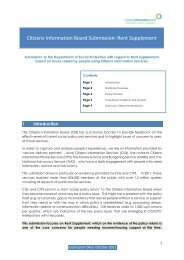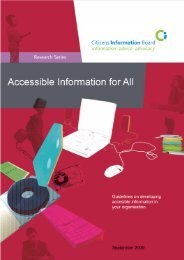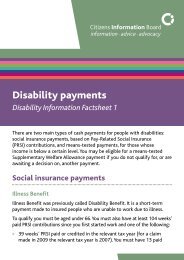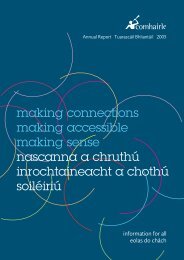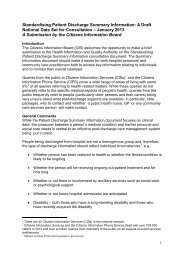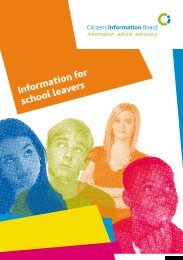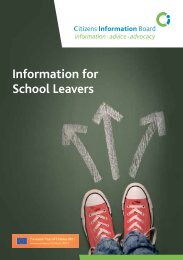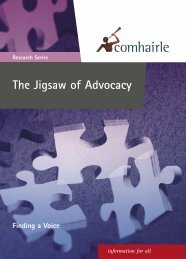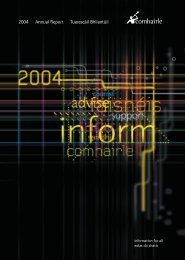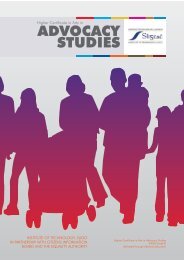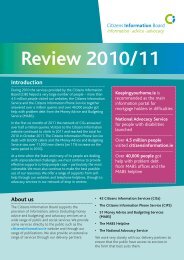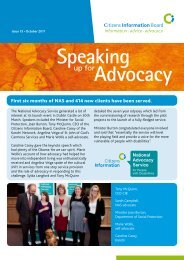Review of Sign Language Interpretation Services and Service ...
Review of Sign Language Interpretation Services and Service ...
Review of Sign Language Interpretation Services and Service ...
- No tags were found...
Create successful ePaper yourself
Turn your PDF publications into a flip-book with our unique Google optimized e-Paper software.
Sustaining Progress, Social Partnership Agreement 2003-2005 Section 20, states:Development <strong>and</strong> Training20.20 “Flexibility in the public service is dependent on the adaptability <strong>of</strong> skills<strong>of</strong> staff. Enhancing performance is equally dependent on the knowledge,skills <strong>and</strong> other competencies <strong>of</strong> staff... the parties are committed tocontinued training <strong>and</strong> development for all staff”.Equal Opportunities20.22 “Human Resource Management in the public service must continue to…<strong>of</strong>fer services to the public which must take full account <strong>of</strong> theincreasingly diverse nature <strong>of</strong> our society”.Detailed action plans <strong>and</strong> progress reports from the various social partners inrelation to Section 20 <strong>of</strong> Sustaining Progress show that actions are being takenunder 20.20 to provide staff with training in Irish <strong>Sign</strong> <strong>Language</strong>. Under Section20.22, actions are being taken to ensure maximum accessibility by providingfacilities for persons with a disability, including sign language interpretationservices <strong>and</strong> other services as needs arise.3.2.3 Legal basis for sign language interpretation servicesThere is no one comprehensive piece <strong>of</strong> legislation which lays out the specificrights/entitlements <strong>of</strong> Deaf people regarding access to SLI services. However,there are various other pieces <strong>of</strong> legislation which underpin the eligibility <strong>of</strong> theDeaf community in relation to accessing sign language interpretation services.The fragmented nature <strong>of</strong> the legislative context has led to differing practicesamongst different public service providers in the provision <strong>of</strong> SLI services.Legislation is now in place to protect people with disabilities from discrimination inemployment <strong>and</strong> in access to goods, services, accommodation <strong>and</strong> education.This section outlines some <strong>of</strong> the key pieces <strong>of</strong> legislation which provide the basisfor SLI services which can be accessed by Deaf people. For example, undervarious pieces <strong>of</strong> legislation such as the Education Act 1998, Employment EqualityAct 1999 <strong>and</strong> Equal Status Act 2000, employers <strong>and</strong> service providers areobligated (with due consideration to 'reasonable accommodation') to provide signlanguage interpreters in a variety <strong>of</strong> domains - examples <strong>of</strong> which include signedinterpretation at lectures <strong>and</strong> classes at third-level where a Deaf person isstudying, staff meetings <strong>and</strong> training days, conferences, launches, courtappearances <strong>and</strong> medical appointments.The Equal Status Act 2000 prohibits colleges from discriminating against studentson the basis <strong>of</strong> disability. The Act applies to all education institutions, both public<strong>and</strong> private, which are prohibited from discriminating against students withdisabilities in terms <strong>of</strong>:• Admission• Terms <strong>and</strong> conditions <strong>of</strong> admission• Access to any coursepage 38 • <strong>Review</strong> <strong>of</strong> <strong>Sign</strong> <strong>Language</strong> <strong>Interpretation</strong> <strong><strong>Service</strong>s</strong> <strong>and</strong> <strong>Service</strong> Requirements in Irel<strong>and</strong>



